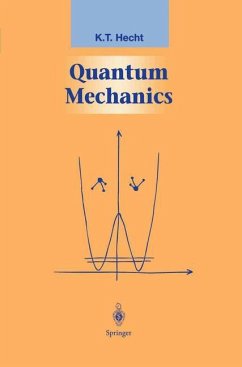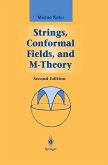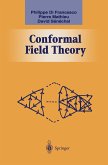K. T. Hecht
Quantum Mechanics
K. T. Hecht
Quantum Mechanics
- Broschiertes Buch
- Merkliste
- Auf die Merkliste
- Bewerten Bewerten
- Teilen
- Produkt teilen
- Produkterinnerung
- Produkterinnerung
Intended for beginning graduate students, this text takes the reader from the familiar coordinate representation of quantum mechanics to the modern algebraic approach, emphsizing symmetry principles throughout. After an introduction of the basic postulates and techniques, the book discusses time-independent perturbation theory, angular momentum, identical particles, scattering theory, and time-dependent perturbation theory. It concludes with several lectures on relativistic quantum mechanics and on many-body theory
Andere Kunden interessierten sich auch für
![Strings, Conformal Fields, and M-Theory Strings, Conformal Fields, and M-Theory]() Michio KakuStrings, Conformal Fields, and M-Theory94,99 €
Michio KakuStrings, Conformal Fields, and M-Theory94,99 €![Energy Storage and Redistribution in Molecules Energy Storage and Redistribution in Molecules]() Energy Storage and Redistribution in Molecules111,99 €
Energy Storage and Redistribution in Molecules111,99 €![Mesoscopic Physics of Complex Materials Mesoscopic Physics of Complex Materials]() T. S. ChowMesoscopic Physics of Complex Materials39,99 €
T. S. ChowMesoscopic Physics of Complex Materials39,99 €![Mathematical Topics Between Classical and Quantum Mechanics Mathematical Topics Between Classical and Quantum Mechanics]() Nicholas P. LandsmanMathematical Topics Between Classical and Quantum Mechanics154,99 €
Nicholas P. LandsmanMathematical Topics Between Classical and Quantum Mechanics154,99 €![Conformal Field Theory Conformal Field Theory]() Philippe FrancescoConformal Field Theory159,99 €
Philippe FrancescoConformal Field Theory159,99 €![Quantum Electrodynamics Quantum Electrodynamics]() Richard P. FeynmanQuantum Electrodynamics198,99 €
Richard P. FeynmanQuantum Electrodynamics198,99 €![Energy Storage and Redistribution in Molecules Energy Storage and Redistribution in Molecules]() Energy Storage and Redistribution in Molecules41,99 €
Energy Storage and Redistribution in Molecules41,99 €-
-
-
Intended for beginning graduate students, this text takes the reader from the familiar coordinate representation of quantum mechanics to the modern algebraic approach, emphsizing symmetry principles throughout. After an introduction of the basic postulates and techniques, the book discusses time-independent perturbation theory, angular momentum, identical particles, scattering theory, and time-dependent perturbation theory. It concludes with several lectures on relativistic quantum mechanics and on many-body theory
Produktdetails
- Produktdetails
- Graduate Texts in Contemporary Physics
- Verlag: Springer / Springer New York / Springer, Berlin
- Artikelnr. des Verlages: 978-1-4612-7072-0
- Softcover reprint of the original 1st ed. 2000
- Seitenzahl: 784
- Erscheinungstermin: 14. Oktober 2012
- Englisch
- Abmessung: 235mm x 155mm x 42mm
- Gewicht: 1194g
- ISBN-13: 9781461270720
- ISBN-10: 1461270723
- Artikelnr.: 37478327
- Herstellerkennzeichnung Die Herstellerinformationen sind derzeit nicht verfügbar.
- Graduate Texts in Contemporary Physics
- Verlag: Springer / Springer New York / Springer, Berlin
- Artikelnr. des Verlages: 978-1-4612-7072-0
- Softcover reprint of the original 1st ed. 2000
- Seitenzahl: 784
- Erscheinungstermin: 14. Oktober 2012
- Englisch
- Abmessung: 235mm x 155mm x 42mm
- Gewicht: 1194g
- ISBN-13: 9781461270720
- ISBN-10: 1461270723
- Artikelnr.: 37478327
- Herstellerkennzeichnung Die Herstellerinformationen sind derzeit nicht verfügbar.
I Introduction to Quantum Mechanics.- 1 Background: The Duality of Nature.- 2 The Motion of Wave Packets: Fourier Analysis.- 3 The Schrödinger Wave Equation and Probability Interpretation.- 4 Schrödinger Theory: The Existence of Discrete Energy Levels.- 5 Harmonic Oscillator Calculations.- 6 Further Interpretation of the Wave Function.- 7 The Eigenvalue Problem.- 8 Spherical Harmonics, Orbital Angular Momentum.- 9 ?-Step operators for the ? Equation.- 10 The Radial Functions for the Hydrogenic Atom.- 11 Shape-Invariant Potentials: Soluble One-Dimensional Potential Problems.- 12 The Darboux Method: Supersymmetric Partner Potentials.- 13 The Vector Space Interpretation of Quantum-Mechanical Systems.- 14 The Angular Momentum Eigenvalue Problem (Revisited).- 15 Rigid Rotators: Molecular Rotational Spectra.- 16 Transformation Theory.- 17 Another Example: Successive Polarization Filters for Beams of Spin s = 1/2 Particles.- 18 Transformation Theory for Systems with Continuous Spectra.- 19 Time-Dependence of State Vectors, Algebraic Techniques, Coherent States.- II Time-Independent Perturbation Theory.- 20 Perturbation Theory.- 21 Stationary-State Perturbation Theory.- 22 Example 1: The Slightly Anharmonic Oscillator.- 23 Perturbation Theory for Degenerate Levels.- 24 The Case of Nearly Degenerate Levels.- 25 Magnetic Field Perturbations.- 26 Fine Structure and Zeeman Perturbations in Alkali Atoms.- III Angular Momentum Theory.- 27 Angular Momentum Coupling Theory.- 28 Symmetry Properties of Clebsch-Gordan Coefficients.- 29 Invariance of Physical Systems Under Rotations.- 30 The Clebsch-Gordan Series.- 31 Spherical Tensor Operators.- 32 The Wigner-Eckart Theorem.- 33 Nuclear Hyperfine Structure in One-Electron Atoms.- *34 Angular Momentum Recompiling: Matrix Elements of Coupled Tensor Operators in an Angular Momentum Coupled Basis.- *35 Perturbed Coulomb Problems via SO(2,1) Algebra.- 36 The WKB Approximation.- 37 Applications of the WKB Approximation.- IV Systems of Identical Particles.- 38 The Two-Electron Atom.- 39 n-Identical Particle States.- 40 The Variational Method.- V Scattering Theory.- 41 Introduction to Scattering Theory.- 42 The Rayleigh-Faxen-Holtzmark Partial Wave Expansion: Phase Shift Method.- 43 A Specific Example: Scattering from Spherical Square Well Potentials.- 44 Scattering Resonances: Low-Energy Scattering.- 45 Integral Equation for Two-Body Relative Motion: Scattering Green's Functions in Coordinate Representation.- 46 The Born Approximation.- 47 Operator Form of Scattering Green's Function and the Integral Equation for the Scattering Problem.- 48 Inelastic Scattering Processes and Rearrangement Collisions.- 49 Differential Scattering Cross Sections for Rearrangement Collisions: Born Approximation.- 50 A Specific Example of a Rearrangement Collision: The (d, p) Reaction on Nucleus A.- 51 The S Matrix.- 52 Scattering Theory for Particles with Spin.- 53 Scattering of Spin 1/2 Particles from Spinless Target: Partial Wave Decomposition.- 54 The Polarization Vector.- 55 Density Matrices.- 56 Isospin.- VI Time-Dependent Perturbation Theory.- 57 Time-Dependent Perturbation Expansion.- 58 Oscillating Magnetic Fields: Magnetic Resonance.- 59 Sudden and Adiabatic Approximations.- VII Atom-Photon Interactions.- 60 Interaction of Electromagnetic Radiation with Atomic Systems.- 61 Photons: The Quantized Radiation Field.- 62 Vector Spherical Harmonics.- 63 The Emission of Photons by Atoms: Electric Dipole Approximation.- 64 The Photoelectric Effect: Hydrogen Atom.- 65 Spontaneous Photon Emission: General Case: Electric and Magnetic Multipole Radiation.- 66 Scattering of Photons by Atomic Systems.- 67 Resonance Fluorescence Cross Section.- 68 Natural Line Width: Wigner-Weisskopf Treatment.- VIII Introduction to Relativistic Quantum Mechanics.- 69 Dirac Theory: Relativistic Quantum Theory of Spin-1/2 Particles.- 70 Lorentz Covariance of the Dirac Equation.- 71 Bilinear Covariants.- 72 Simple Solutions: Free Particle Motion:Plane Wave Solutions.- 73 Dirac Equation for a Particle in an Electromagnetic Field.- 74 Pauli Approximation to the Dirac Equation.- 75 The Klein Paradox: An Example from the History of Negative Energy State Difficulties: The Positron Interpretation.- 76 Exact Solutions for the Dirac Equation for Spherically Symmetric Potentials.- 77 The MIT Bag Model: The Dirac Equation for a Quark Confined to a Spherical Region.- IX Introduction to Many-Body Theory.- 78 Many-Body Formalism.- 79 Many-Body Techniques: Some Simple Applications.
I Introduction to Quantum Mechanics.- 1 Background: The Duality of Nature.- 2 The Motion of Wave Packets: Fourier Analysis.- 3 The Schrödinger Wave Equation and Probability Interpretation.- 4 Schrödinger Theory: The Existence of Discrete Energy Levels.- 5 Harmonic Oscillator Calculations.- 6 Further Interpretation of the Wave Function.- 7 The Eigenvalue Problem.- 8 Spherical Harmonics, Orbital Angular Momentum.- 9 ?-Step operators for the ? Equation.- 10 The Radial Functions for the Hydrogenic Atom.- 11 Shape-Invariant Potentials: Soluble One-Dimensional Potential Problems.- 12 The Darboux Method: Supersymmetric Partner Potentials.- 13 The Vector Space Interpretation of Quantum-Mechanical Systems.- 14 The Angular Momentum Eigenvalue Problem (Revisited).- 15 Rigid Rotators: Molecular Rotational Spectra.- 16 Transformation Theory.- 17 Another Example: Successive Polarization Filters for Beams of Spin s = 1/2 Particles.- 18 Transformation Theory for Systems with Continuous Spectra.- 19 Time-Dependence of State Vectors, Algebraic Techniques, Coherent States.- II Time-Independent Perturbation Theory.- 20 Perturbation Theory.- 21 Stationary-State Perturbation Theory.- 22 Example 1: The Slightly Anharmonic Oscillator.- 23 Perturbation Theory for Degenerate Levels.- 24 The Case of Nearly Degenerate Levels.- 25 Magnetic Field Perturbations.- 26 Fine Structure and Zeeman Perturbations in Alkali Atoms.- III Angular Momentum Theory.- 27 Angular Momentum Coupling Theory.- 28 Symmetry Properties of Clebsch-Gordan Coefficients.- 29 Invariance of Physical Systems Under Rotations.- 30 The Clebsch-Gordan Series.- 31 Spherical Tensor Operators.- 32 The Wigner-Eckart Theorem.- 33 Nuclear Hyperfine Structure in One-Electron Atoms.- *34 Angular Momentum Recompiling: Matrix Elements of Coupled Tensor Operators in an Angular Momentum Coupled Basis.- *35 Perturbed Coulomb Problems via SO(2,1) Algebra.- 36 The WKB Approximation.- 37 Applications of the WKB Approximation.- IV Systems of Identical Particles.- 38 The Two-Electron Atom.- 39 n-Identical Particle States.- 40 The Variational Method.- V Scattering Theory.- 41 Introduction to Scattering Theory.- 42 The Rayleigh-Faxen-Holtzmark Partial Wave Expansion: Phase Shift Method.- 43 A Specific Example: Scattering from Spherical Square Well Potentials.- 44 Scattering Resonances: Low-Energy Scattering.- 45 Integral Equation for Two-Body Relative Motion: Scattering Green's Functions in Coordinate Representation.- 46 The Born Approximation.- 47 Operator Form of Scattering Green's Function and the Integral Equation for the Scattering Problem.- 48 Inelastic Scattering Processes and Rearrangement Collisions.- 49 Differential Scattering Cross Sections for Rearrangement Collisions: Born Approximation.- 50 A Specific Example of a Rearrangement Collision: The (d, p) Reaction on Nucleus A.- 51 The S Matrix.- 52 Scattering Theory for Particles with Spin.- 53 Scattering of Spin 1/2 Particles from Spinless Target: Partial Wave Decomposition.- 54 The Polarization Vector.- 55 Density Matrices.- 56 Isospin.- VI Time-Dependent Perturbation Theory.- 57 Time-Dependent Perturbation Expansion.- 58 Oscillating Magnetic Fields: Magnetic Resonance.- 59 Sudden and Adiabatic Approximations.- VII Atom-Photon Interactions.- 60 Interaction of Electromagnetic Radiation with Atomic Systems.- 61 Photons: The Quantized Radiation Field.- 62 Vector Spherical Harmonics.- 63 The Emission of Photons by Atoms: Electric Dipole Approximation.- 64 The Photoelectric Effect: Hydrogen Atom.- 65 Spontaneous Photon Emission: General Case: Electric and Magnetic Multipole Radiation.- 66 Scattering of Photons by Atomic Systems.- 67 Resonance Fluorescence Cross Section.- 68 Natural Line Width: Wigner-Weisskopf Treatment.- VIII Introduction to Relativistic Quantum Mechanics.- 69 Dirac Theory: Relativistic Quantum Theory of Spin-1/2 Particles.- 70 Lorentz Covariance of the Dirac Equation.- 71 Bilinear Covariants.- 72 Simple Solutions: Free Particle Motion:Plane Wave Solutions.- 73 Dirac Equation for a Particle in an Electromagnetic Field.- 74 Pauli Approximation to the Dirac Equation.- 75 The Klein Paradox: An Example from the History of Negative Energy State Difficulties: The Positron Interpretation.- 76 Exact Solutions for the Dirac Equation for Spherically Symmetric Potentials.- 77 The MIT Bag Model: The Dirac Equation for a Quark Confined to a Spherical Region.- IX Introduction to Many-Body Theory.- 78 Many-Body Formalism.- 79 Many-Body Techniques: Some Simple Applications.
"The volume represents a solid and high level basis for lecturing in a first year graduate course on quantum mechanics. It is self-contained ... provides future research workers with the tools required to solve real problems. ... More than 100 illustrations are included ... . The volume can be used by students without previous knowledge of quantum mechanics and by researchers in the field; it represents a beneficial investment for libraries and individuals as well." (V.Balan, zbMATH 0964.81001, 2022)








